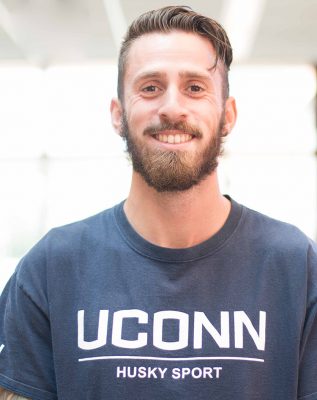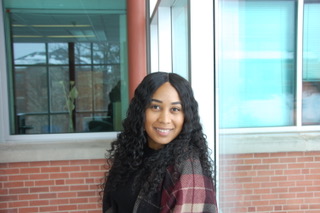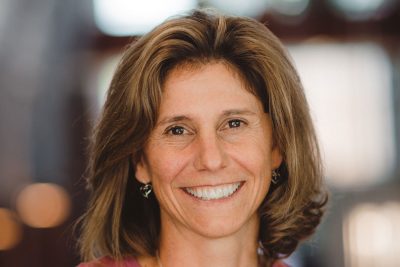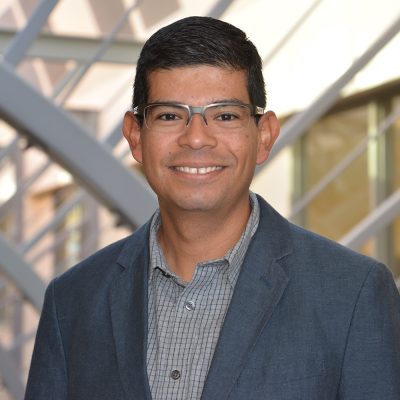Thanks to the Initiative on Campus Dialogues (ICD) Fellowship Program at UConn, members of the Neag School community are engaging in projects focused on expanding productive dialogue within and beyond the University community.

Charles Macaulay and Ajhanai Newton, third-year Ph.D. students in the Neag School of Education’s Learning, Leadership, and Educational Policy (LLEP) Program, were two individuals selected this past fall as ICD Fellows for the 2019-20 academic year.
The program, a University-wide partnership now in its third year, seeks to bring together humanities research and community engagement. Sponsors of the program include the Thomas J. Dodd Research Center, Office of Public Engagement, Humanities Institute, and numerous other academic, service, and administrative units from across UConn.
As part of this yearlong learning experience, Macaulay and Newton are meeting with other ICD Fellowship teams throughout the academic year to discuss and apply dialogue and deliberation tools to specific community problems.
Reimagining Coursework
Macaulay and Newton’s project seeks to reconceptualize two sport management courses at the Neag School into spaces where diverse topics can be discussed and difficult conversations can be had. They titled the project “Sport Talk: Creating Dialogical Classrooms for the Development of Future Sport Leaders.” With guidance from Neag School faculty Laura Burton and Justin Evanovich, they say they hope to transform these classes into places where students can challenge normalized practices within the sports industry.
“The overall goal of the ICD Fellowship is to engage educators on how to create dialogue in the classroom, from our teaching practices to the curriculum that we present.”
— Charles Macaulay, 2019-20 ICD Fellow
“It’s the topics that are very social-political and sociocultural that we see individuals struggle to have civil dialogue around,” says Newton. “When we read the grant, all these different sport topics were happening to where it was like ‘OK, this is where we fit.’”
Macaulay and Newton will each be lead instructors in sport management courses this spring, an opportunity that Newton says is rare among typical doctoral programs. Macaulay will teach Sport Facility and Event Management, and Newton will teach Sport Management. The ICD Fellowship Program allows the two to reimagine the structure of these courses to create a dialogue-centered curriculum.
“We had been talking for a while about how we can put our mark on these classes and enhance what we are teaching, as well as bring a critical lens to discuss some of the larger social issues that are happening throughout our society,” says Macaulay.

Macaulay says he will be discussing social issues such as workplace diversity and polarization so that students are able to consider and understand different perspectives to work successfully in teams in any work environment.
“You don’t always get to choose who you work with, and being able to understand individuals who hold different beliefs, values, and lifestyles will make students more flexible and stronger leaders,” he says.
When the two learned of the ICD Fellowship opportunity, they both believed it aligned perfectly with the work they were trying to do at the Neag School.
“The grant itself is meant to build curriculum while centering dialogue in the classroom, and we wanted to see what we could learn from [the ICD Fellowship] community and what skills we could develop to take into our classrooms,” says Macaulay.
Dialogue is essential in the classroom, say Macaulay and Newton, because it allows students to respond to one another in a manner that evokes curiosity and questioning, rather than combativeness.
To encourage dialogue in his classroom, Macaulay says he will have students work together in teams to critically access and remedy a workplace issue each week. The teamwork will force students to articulate their ideas and challenge one another in order to reach a sound decision.
“There are no right answers on how to handle these issues, but there are multiple ways to handle them,” says Macaulay.
Each Fellowship team may receive up to $5,000 that can be used for travel, honoraria, materials, and publicity.
Intersection of Sport and Education

Neither Macaulay nor Newton initially pictured themselves pursuing education as a career. They each had studied sociology as undergraduate students and found interest in courses on African American student-athletes and the intersection of race and sport.
At the University of British Columbia, Macaulay wrote his senior thesis on how greater investment in college athletic programs yields a higher enrollment of black student-athletes. It was through that research that Macaulay met former Neag School professor Joseph Cooper, who invited him to UConn to earn his Ph.D. in LLEP.
Newton, a student-athlete during her undergraduate career at Colorado State University, had wanted to work in collegiate athletics or conduct research in the field. After receiving her master’s in educational leadership and policy from the University of Texas at Austin, Newton was drawn to the Neag School for her doctoral degree.
“I noticed something unique about UConn’s program, where it situates how education and sport intersect,” she says.
Creating Dialogue in the Classroom
The ICD Fellows spent the fall semester discussing how dialogue can be best fostered in the classroom. Teams met every four to five weeks to share their project goals and put dialogue into practice through scenario and facilitation workshops.
“We are thinking about what dialogue is, and how does that differ from classroom discussion,” says Newton.
From Newton’s perspective, dialogue is the process of engaging and questioning topics and peers with curiosity. Unlike traditional classroom discussion, she says dialogue is a process of being comfortable with having one’s thoughts and opinions questioned, while grappling with opposing viewpoints.
The spring semester will center on curriculum building. Macaulay and Newton say they are determining how to integrate dialogue into the curriculum, but also design curriculum that is built on dialogue. Over the winter break, they have worked to adjust their syllabi for the spring courses to include material that encourages dialogue.
“I want to say that I was aligned with continuing to … position our program to be known for being critical of sport and how we consume sport.”
— Ajhanai Newton, 2019-20 ICD Fellow
They both plan to hold weekly dialogue sessions in their classrooms, offering students a space to share their ideas, hear different perspectives, and build new ideas with their peers. Students will deconstruct workplace issues and situations, and propose solutions to those problems.
“The overall goal of the ICD Fellowship is to engage educators on how to create dialogue in the classroom, from our teaching practices to the curriculum that we present,” says Macaulay.
The grant ends in May, and Newton says she and Macaulay plan to have an end-of-year conversation with the broader sport management community on the accomplishments and challenges they faced through the ICD Fellowship.
Beyond the Fellowship
Macaulay says he hopes to create a dialogue-centered structure in the Sport Facility and Event Management course that can be handed down to the next set of Ph.D. students or faculty members, so that future graduates are better prepared in their transition from the University to the sport industry.
“Our alumni are going to experience and interact with individuals of different identities, of different backgrounds, of different political beliefs, and yet they are still going to have to work with them,” he says. “If they are engaging in difficult conversations but then also acknowledging that we can gain something from those difficult conversations, they are going to be more prepared to enter into the workforce and be successful to lead those conversations.”
Newton says her goal upon completing the ICD Fellowship is to continue to develop the Neag School’s sport management program to be seen as one that situates how social justice and sport intersect.
In the years ahead, she says, “I want to say that I was aligned with continuing to … position our program to be known for being critical of sport and how we consume sport. I think that … is what drew me to the program, and so continuing to be a part of that legacy is really important for me.”
Additional Neag School ICD Fellows
The ICD Fellowship was awarded to two additional members of the Neag School for 2019-20:
Patricia O’Rourke, a doctoral student in curriculum and instruction, is a Fellow on “Continuing Project: Democratic Public Dialogue on Equity and Integration in Education.”

O’Rourke has been actively engaged in community dialogue centered around school diversity and integration for more than three years.
She is joined by two school integration leaders, Gina Chirichigno and Attorney Cheryl A. Sharp. Their project aims to expand support for democratic public dialogue and effective participatory policymaking in the public education sphere. Together, they hope to bridge the worlds of academic scholarship and community engagement in a “research and practice” collaboration.
Gerardo Blanco, associate professor of higher education and student affairs at the Neag School, is also a Fellow, with political science Ph.D. candidate Sercan Canbolat, on “Promoting Cosmopolitanism Through Global Dialogue in the Classroom.” This project seeks to incorporate strategies for dialogue into curriculum associated with Global House, a UConn Learning Community that brings together U.S. and international students.
Learn more about the ICD Fellowship Program and this year’s Fellows.
 Facebook
Facebook
 Twitter
Twitter
 LinkedIn
LinkedIn
